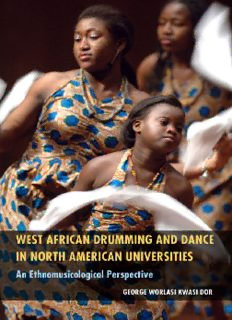
West African Drumming and Dance in North American Universities: An Ethnomusicological Perspective PDF
Preview West African Drumming and Dance in North American Universities: An Ethnomusicological Perspective
West AfricAn Drumming AnD DAnce in north AmericAn universities This page intentionally left blank West AfricAn Drumming AnD DAnce in north AmericAn universities An ethnomusicological Perspective george WorlAsi KWAsi Dor University Press of MississiPPi • Jackson www.upress.state.ms.us The University Press of Mississippi is a member of the Association of American University Presses. Copyright © 2014 by University Press of Mississippi All rights reserved Manufactured in the United States of America First printing 2014 ∞ Library of Congress Cataloging-in-Publication Data Dor, George Worlasi Kwasi, author. West African drumming and dance in North American universities : an ethno- musicological perspective / George Worlasi Kwasi Dor. — First printing. pages cm Includes bibliographical references and index. ISBN 978-1-61703-914-0 (cloth : alk. paper) — ISBN 978-1-61703-915-7 (ebook) 1. Drum—Instruction and study—North America. 2. Drum—West Africa—In- fluence. 3. Dance—Study and teaching (Higher)—North America. 4. Dance, Black—Africa, West—Influence. I. Title. MT662.D67 2014 786.90966’0973—dc23 2013028812 British Library Cataloging-in-Publication Data available For steadfast love and support, I dedicate this book to Rose Ama, Yawa Nyuiemedi, Mozart Nuku, Joana Dziedzom, and Shelter Senyoagbe, my beloved family living here in Oxford, Mississippi. To the virtuosic custodians of African indigenous knowledge who have originated and planted the various dance drumming genres that our stu- dents learn to perform. You have given the world some of its most sublime artistic expression. Even kings cannot resist taking regal steps to the vitality and affect from the vibes of your ingenious creativity. This page intentionally left blank contents Acknowledgments IX Introduction 3 1. Historical Overview of West African Drumming and Dance in North America From the Period of Slavery (1619–1863) until the Early 1960s 14 2. Selected University Ensembles History, Resources, Repertoire, Teaching, Learning, Performance(s), and Reception 44 3. Pedagogical Approaches of Dance Drumming Instructors 98 4. The Impact of West African Drumming and Dance on the Participating Student 131 5. Path-finding Agency of Administrators and Ensemble Directors 156 6. A Transplanted Musical Practice Flourishing in the African Diaspora 188 7. World Music and Globalization West African Drum-Dance Ensembles 225 Postscript 254 Appendix A. Interviews Consultants and Field Sites [University Campuses and Conferences] 267 viii contents Appendix B. A Survey for Student Members of Ensembles 269 Notes 280 Glossary 284 References 292 Index 301 AcKnoWleDgments Projects such as this book begin with ideas. As such, I thank Adam Gussow, professor of English at the University of Mississippi, a passionate blues musi- cian and a friend, who suggested to me to consider exploring the Ole Miss African Drum and Dance Ensemble as a possible theme for my University of Mississippi Faculty Research Fellowship proposal. I gratefully received the idea, expanded it to cover similar ensembles in North America, and that pro- posal positively yielded the award of the fellowship. I am indebted to the Office of Research and Sponsored Programs for the award of the Faculty Research Fellowship that empowered me to conduct my ethnographic field trips to university campuses where I interviewed consultants and other informants. Also, I thank the University of Missis- sippi’s Office of Multicultural Affairs (Don Cole), the Department of Music (Charles Gates), and again the ORSP for financially sponsoring other travels including conferences during which I interviewed other informants. Furthermore, I thank the University of Mississippi for granting me a sab- batical leave during which I wrote most of the chapters of this book. My next and profound acknowledgment goes to all the research consul- tants for their shared knowledge, time, and other resources, but above all, the special hospitality that most of you accorded me. Dance drumming di- rectors/teachers: Kobla and Beatrice Ladzekpo, Gideon Alorwoyie, David Locke, Christopher Ladzekpo, Kwasi Dunyo, Anna Melnikoff, Modesto Amegago, Elikem Samuel Nyamuame, James Burns, Patricia Tang, Kofi Gbolonyo, Ama Aduonum, Kwasi Ampene, Robert Simms, Frank Gunder- son, Damascus Kafumbe, and Charles Lwanga. Also, I am grateful to mem- bers of the Society for Ethnomusicology’s (SEM) African Music Section for organizing activities that resonate with this book’s theme. I sincerely thank the following administrators for their support for my project: Olly Wilson, Jacqueline DjeDje, Russell Hartenberger, Glenn Hop- kins, Charles Gates, and Eric Charry. The invaluable insights you shared IX
Description: